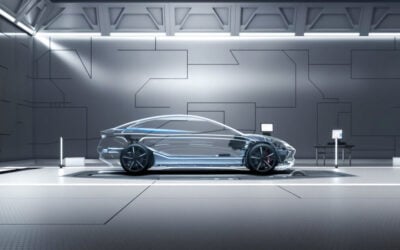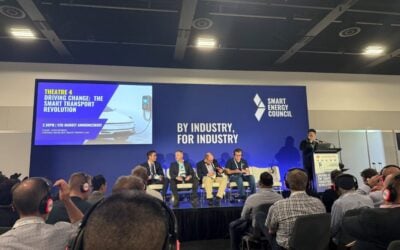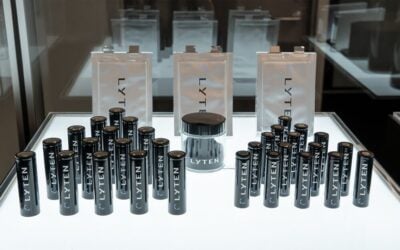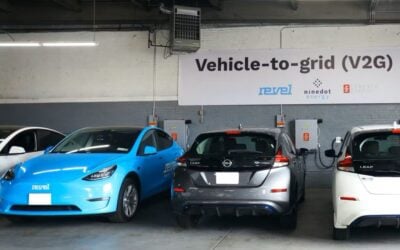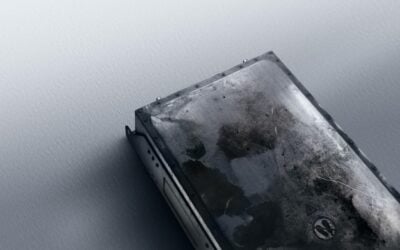Seeo fits into the 'mid-pack' of the Lux Research Innovation Grid of interviewed solid-state battery developers. Image: Lux Research Inc.
The acquisition of a “next generation” battery start-up by Bosch could be a milestone for the e-mobility sector, but represents a risk for the German engineering giant, according to one analyst.
Bosch confirmed last week in an interview with Reuters that it had purchased Seeo, a California-based developer of solid-state batteries for energy storage for an undisclosed price. According to Cosmin Laslau of Lux Research, the acquisition marks a “major turning point for the battery industry”.
Enjoy 12 months of exclusive analysis
- Regular insight and analysis of the industry’s biggest developments
- In-depth interviews with the industry’s leading figures
- Annual digital subscription to the PV Tech Power journal
- Discounts on Solar Media’s portfolio of events, in-person and virtual
It is the first purchase of a next-generation battery developer by a major player in the automotive industry, Laslau said, and is likely to mark the beginning of a “buying spree” as hopefuls look to carve out a share of the ever-growing electric car industry using advanced batteries. Seeo has developed DryLyte, a non-flammable polymer electrolyte for its solid-state lithium batteries and had been actively seeking partners to commercialise the technology with until Bosch’s interest took over. Previous investors into the company included Samsung which joined a funding round in late 2014.
The purchase, which includes Seeo’s R&D staff and intellectual property (IP), closed in mid-August. Laslau sounded a note of caution over the deal, saying that the company’s cost claims are still unproven and described the company as a “fragile start-up” that might have struggled in its ongoing efforts to switch from lithium iron phosphate cathodes to nickel cobalt aluminium (NCA) without outside intervention.
Seeo could help Bosch meet 2020 energy density target
Through ramping up its production output, Seeo was targeting an energy density of 350 Watt-hours per kilogram (Wh/kg), which would fit with an existing ambition on Bosch’s part to reach the 300-400 Wh/kg mark by 2020, as referenced by Bosch CEO Volkmar Denner earlier this year.
According to Laslau, this potential fit with Bosch’s aims makes the Seeo purchase a good fit for the German company – if it managed to buy the start-up at a decent price. Charting the technical value of various solid-state battery makers interviewed by Laslau and his team against their business execution, Seeo performed mid-pack. This was due to Seeo having so-far unproven cost claims, an “appetite for burning through cash” and low ionic conductivity, which Laslau said limited the power available and meant the battery needs to be heated to work.
Despite the risk, Laslau said, if Bosch wanted to be a key player in such a limited and competitive space, the buy was “almost a necessary one”.
According to Cosmin Laslau of Lux Research, the Bosch-Seeo deal marks "the first instance of a major automotive player outright acquiring a next-generation battery developer" and could spark a wave of similar activity. Image: Bosch.
The challenge of overtaking lithium-ion
Finally, Laslau said that despite the interest in solid-state battery tech, Lux Research did not expect lithium-ion to be displaced from its leading position among automotive makers anytime soon. He said that automotive makers and attendant supply chains should be on the lookout for acquisition opportunities while “doubling down on internal research and development efforts to push beyond Li-ion”.
“Expectations should be managed…Despite the growing hype around solid-state batteries, do not expect Li-ion to lose its crown in the next decade,” Laslau said.
“It will be surpassed eventually, and those that prepare now by securing key IP and leading researchers, will be the best positioned to prevail in the future of transportation drivetrains.”
Laslau and his team are regular Guest Blog contributors for PV Tech Storage as well as frequent commentators for the site. On battery 'breakthroughs', Laslau's colleague Lilia Xie wrote about start-up 24M's targeted US$100 per kWh costs for its new lithium ion battery tech. On the Bosch-Seeo deal, Laslau pointed out that there could be promise in the pre-commercial, still-in-the-lab tech developed by companies including Ilika and ProLogium. He said that while all have their strengths and weaknesses and Seeo’s batteries will still require some investment from Bosch to commercialise successfully, the solid-state battery space is starting to heat up, with rumoured interest from Apple in Infinite Power – a company Lux highlighted as risky in its chart of innovative solid-state makers. Meanwhile, battery makers looking “beyond lithium” are partnering with the automotive industry players, such as lithium sulfur battery developer Oxis Energy’s deal with Volkswagen.

